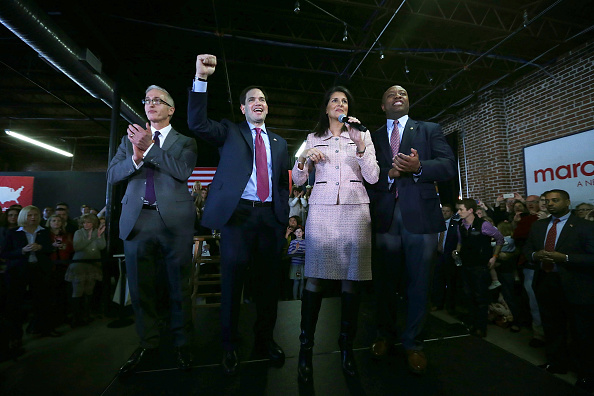
The two front runners for the Republican nomination have run campaigns focused on looking past the nation’s changing demographics. Real estate mogul Donald Trump delights in speaking crudely about Mexico sending rapists and Muslims jihadists trying to infiltrate the country. And Texas Senator Ted Cruz’s campaign architect Jason Johnson speaks openly about winning the White House by turning out white votes and losing Latinos by huge margins.
But in the final days of the South Carolina primary, a different vision has emerged, more in line with what GOP leaders demanded after losing the 2012 presidential race.
“Take a picture of this, because the new group of conservatives that’s taking over America looks like a Benetton commercial,” said Nikki Haley, the state’s Indian-American governor, as she stood next to Tim Scott, a black U.S. Senator from the Palmetto State, and Florida Senator Marco Rubio, a Cuban American with a shot at winning the Republican nomination.
The striking image of youth and diversity is exactly what the party had hoped to show — and one which has been elusive in the age of Trump — over the past year.
“I’m so excited — I wish I could have been there to see it,” gushed Glenn McCall, the Republican National Committeeman from South Carolina and one of the authors of the party’s 2012 autopsy. “To me it’s showing, it’s not just talking about it, it’s not just a report that’s recommending various things that we do as a party. You can see our new party now.”
On the campaign trail, Rubio and his aides frequently point to a crowd relatively more representative of the changing country compared to his Republican rivals as a sign of his electability in a general election. A central theme of Rubio’s stump speech is that he has lived as those whom he needs to attract to the party live. He boasts having a student loan until just a few years ago, when he used the advance from his memoir to pay it off. He speaks of his family members who live paycheck-to-paycheck and says Democrats can’t “lecture” him on immigration because “I come from a family of immigrants.”
“At a time when most GOP rallies are mostly white, Marco Rubio is flanked by two leaders of color,” GOP pollster Frank Luntz said. “That message won’t be lost on the electorate.”
Haley’s endorsement of Rubio on Wednesday provided a badly needed boost to his campaign, as he seeks to establish himself as the lead alternative to Trump and Cruz, and more important, deprived Establishment rival Jeb Bush of a the same jolt.
“I wanted somebody that was going to go and show my parents that the best decision they ever made for their children was coming to America,” Haley said as she endorsed Rubio on Wednesday night, alluding to their shared biography as children of immigrants. In an ad for Rubio airing in South Carolina, she proclaims, “This election is about the future, and the future is now.” For many in the GOP establishment, they certainly hope so.
Standing in the way of that future are Trump and Cruz, who combined win over a majority of GOP voters and pledge to turn out more traditional GOP voters in ever greater numbers. But the demographic changes are undeniable, Scott told TIME, arguing that by 2020 or 2024 the party will have to expand its reach “or we’ll lose and keep losing.”
“If you haven’t lived it, it’s very hard to relate,” says Katie Packer, a GOP consultant and Mitt Romney campaign alum. “I think Mitt had that struggle, I think Hillary has that struggle, I think Donald Trump will certainly have that struggle.”
Speaking to reporters a day after making the endorsement official, Rubio praised Haley as “everything the Republican Party should be in the 21st century.” Haley returned the favor. “Are we the new faces of the Republican Party? I hope we’re the new faces of the conservative movement that’s going to D.C. to say enough is enough,” she said.
“Marco’s campaign represents a new generation of conservative leaders,” said senior adviser Todd Harris. “This campaign represents a Republican Party that doesn’t look like our dad’s Republican Party. Someone like Governor Haley is not just the political embodiment, but the personal embodiment as well.”
Asked in a CNN town hall about his own experience with racism, Rubio reflected on his childhood, saying he experienced taunts during the Mariel boatlift in 1980, before highlighting the change that’s taken place in the country.
“In my campaign for President today, I got the endorsement of a governor of Indian descent, who endorsed a presidential candidate of Cuban descent, and tomorrow will be campaigning alongside an African-American Republican Senator, all three are doing that here inside South Carolina,” Rubio said, marveling at the changes in South Carolina since the civil rights era. “That says a lot about the Republican Party.”
Henry Barbour, one of the authors of the GOP’s 2012 autopsy, the Growth and Opportunity Project, which called on the party to highlight leaders from minority communities, highlighted the contrast between the front runners and candidates, including one who has since dropped out, who were trying to expand the Republican voter base.
“The GOP must in fact and deed be inclusive and welcoming if we want to win the White House,” he said. “Marco Rubio, Jeb Bush and Rand Paul are doing just that, while Donald Trump and Ted Cruz align with Barack Obama’s strategy of dividing the country to turn out your base. That makes for bad politics and even worse governing.”
More Must-Reads from TIME
- Inside Elon Musk’s War on Washington
- Meet the 2025 Women of the Year
- Why Do More Young Adults Have Cancer?
- Colman Domingo Leads With Radical Love
- 11 New Books to Read in Februar
- How to Get Better at Doing Things Alone
- Cecily Strong on Goober the Clown
- Column: The Rise of America’s Broligarchy
Contact us at letters@time.com